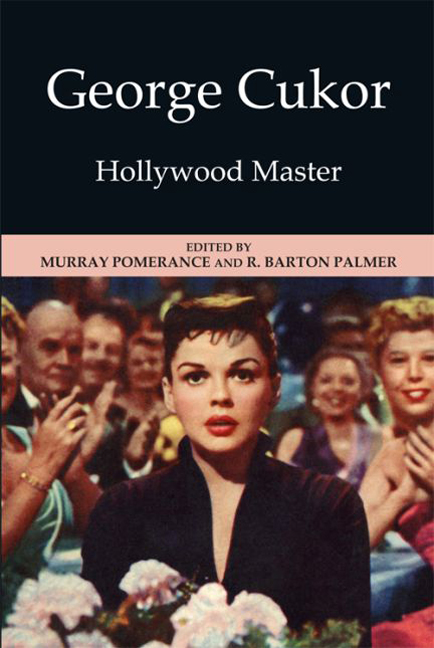Book contents
- Frontmatter
- Contents
- List of Figures
- List of Contributors
- Acknowledgments
- Introduction
- 1 Cukor's Tragicomedies of Marriage: Dinner at Eight, No More Ladies, The Women, and The Marrying Kind
- 2 George Cukor's Late Style: Justine, Travels With My Aunt, and Rich and Famous
- 3 Libel, Scandal, and Bad Big Names: It Should Happen to You, Les Girls, Camille, and Romeo and Juliet
- 4 The Cukor “Problem”: David Copperfield, Holiday, and The Philadelphia Story
- 5 Modulations of the Shot: The Quiet Film Style of George Cukor in What Price Hollywood?, Born Yesterday, Sylvia Scarlett, and My Fair Lady
- 6 Doubling in the Cinema of George Cukor: The Royal Family of Broadway, A Bill of Divorcement, A Double Life, and Bhowani Junction
- 7 George Cukor and the Case of an Actor's Director: Hepburn and/or Tracy in Little Women, The Actress, Keeper of the Flame, Adam's Rib, and Pat and Mike
- 8 Cukor Maudit: Tarnished Lady, Girls About Town, Our Betters, Susan and God, Desire Me, Edward, My Son, The Model and the Marriage Broker, Let's Make Love, and The Chapman Report
- 9 George Cukor's Theatrical Feminism: Gaslight, Heller in Pink Tights, A Life of Her Own, and A Star is Born
- 10 The Furthest Side of Paradise: Two-Faced Woman, A Woman's Face, Hot Spell, Wild is the Wind, and Winged Victory
- Works Cited and Consulted
- Index
8 - Cukor Maudit: Tarnished Lady, Girls About Town, Our Betters, Susan and God, Desire Me, Edward, My Son, The Model and the Marriage Broker, Let's Make Love, and The Chapman Report
Published online by Cambridge University Press: 07 October 2017
- Frontmatter
- Contents
- List of Figures
- List of Contributors
- Acknowledgments
- Introduction
- 1 Cukor's Tragicomedies of Marriage: Dinner at Eight, No More Ladies, The Women, and The Marrying Kind
- 2 George Cukor's Late Style: Justine, Travels With My Aunt, and Rich and Famous
- 3 Libel, Scandal, and Bad Big Names: It Should Happen to You, Les Girls, Camille, and Romeo and Juliet
- 4 The Cukor “Problem”: David Copperfield, Holiday, and The Philadelphia Story
- 5 Modulations of the Shot: The Quiet Film Style of George Cukor in What Price Hollywood?, Born Yesterday, Sylvia Scarlett, and My Fair Lady
- 6 Doubling in the Cinema of George Cukor: The Royal Family of Broadway, A Bill of Divorcement, A Double Life, and Bhowani Junction
- 7 George Cukor and the Case of an Actor's Director: Hepburn and/or Tracy in Little Women, The Actress, Keeper of the Flame, Adam's Rib, and Pat and Mike
- 8 Cukor Maudit: Tarnished Lady, Girls About Town, Our Betters, Susan and God, Desire Me, Edward, My Son, The Model and the Marriage Broker, Let's Make Love, and The Chapman Report
- 9 George Cukor's Theatrical Feminism: Gaslight, Heller in Pink Tights, A Life of Her Own, and A Star is Born
- 10 The Furthest Side of Paradise: Two-Faced Woman, A Woman's Face, Hot Spell, Wild is the Wind, and Winged Victory
- Works Cited and Consulted
- Index
Summary
“There are no artistes maudit in Hollywood,” Jean Domarchi says in the first book written about George Cukor, after demonstrating that Hollywood cinema is of necessity capitalist in its form and content (14). But even a director with Cukor's amazing track record has films maudit, and like the films Jean Cocteau first baptized with that untranslatable name, most of them are masterpieces.
Two themes interweave in the following notes: that Cukor's strategy vis-à-vis the Code—vis-à-vis any Code with a capital C—was already in place in Tarnished Lady (1931), and that the economic laws implicit in the Code, the laws of Class, had already been put in their place as cinematic simulacra invented for the occa¬sion. (We'll call these simulacra nonce classes.) It's a given that all this is always happening inside a film because of Cukor's inscription, in his first features, of a form of filmed theater that stages these codes and their subversion just as it does in the films of Jean Renoir and Orson Welles.
Cukor's modernism1 flourished in the 1960s and 1970s (he loved Warhol) (Lambert 152–5) even as his productivity declined, but some of its greatest successes were underground and occurred in offbeat films like the ones I will discuss here, where the Code, aflame, burned most brightly. Cukor also directed scenes in other people's films, so his fragments, unlike those of Welles, are unsigned. The oeuvre even includes an unfinished film, Something's Got to Give, a comic remake of the film maudit par excellence, Desire Me (1947), one of the few films in Hollywood history without a directing credit or so much as a mention in the AFI Catalogue of Feature Films—a fact that has no discernable impact on its dark splendor, while capping the malediction that, at one time or another, has touched all my examples. Hence their curious luminosity.
The Dangerous Thirties
Filmed on location in New York and the Paramount Studios in Astoria, Tarnished Lady extends the little theater of the films made on Paramount's Hollywood soundstages to the world, as Welles would do in Othello (1952). Society playgirl Nancy Courtney (Tallulah Bankhead), whose family has lost its money, makes a marriage of convenience with stuffy stockbroker Norman Cravath (Clive Brook) so that her befuddled mother (Elizabeth Patterson) won't be harassed by bill collectors.
- Type
- Chapter
- Information
- George CukorHollywood Master, pp. 124 - 138Publisher: Edinburgh University PressPrint publication year: 2015



